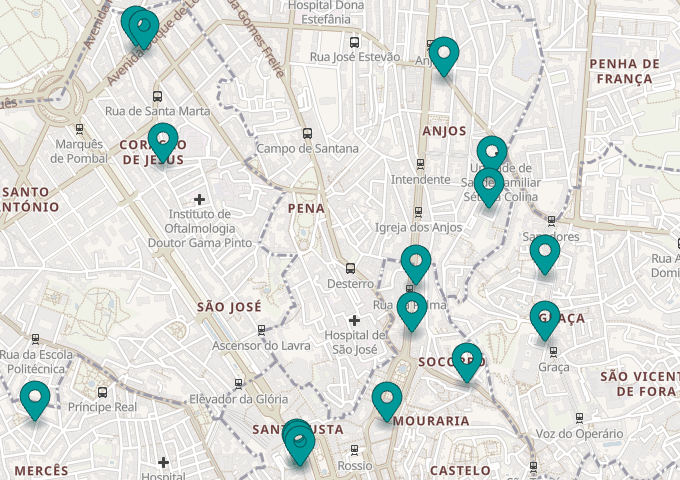
Places API - Accurate Points of Interest Data & Powerful Location Search
More than 500 Categories to query Points of Interest
Places API let you query places and points of interest based on specific categories - restaurants, tourist attractions, historical objects, accommodation, etc.
With our Points of Interest API you can narrow down your search by specifying additional requirements. Looking for a restaurant with free internet access? Need attractions with no entry fees? Require wheelchair accessibility for your accommodation? Our API allows you to refine your results based on your specific needs.
You can query places using different location parameters. Search within a bounding box or radius, explore places within a city, or find the nearest places to a specific location. For example, if you're developing a travel app, users can easily find the nearest coffee shops to their current location.
On this page
Try Places API
To try the Places API, follow these simple steps:
- Set the map view to your desired location.
- Select one or more categories from the dropdown list
- Click the Search button to retrieve relevant places based on your chosen categories.
For more refined results, you can further customize your search by applying additional filter conditions. Simply expand the "Show more options" section to access a range of filtering options.
Explore further API settings and categories with the Places API Playground >>.
For detailed information on using the API, refer to the Places API Documentation page >>.
Points of Interest API Use Cases
The Places API offers a wide range of use cases, empowering developers to create innovative and engaging applications that leverage location-based data.
Whether you're building a travel planner, mapping service, social networking platform, or business directory, the possibilities are endless. Here are some examples of the various use cases that can be achieved with the Points of Interest API:
- Location-Based Recommendations: Enhance your travel app by providing personalized recommendations for restaurants, attractions, and accommodations near the user's current location. For example, "Discover nearby highly-rated restaurants and popular attractions based on your current location."
- Travel Planning: Facilitate travel planning by integrating the Places API to provide users with detailed information about attractions, restaurants, and accommodations at their destination. For example, "Plan your dream vacation by exploring popular attractions, top-rated restaurants, and recommended hotels in your desired travel destination."
- Business Finder: Create a local business directory that allows users to search for specific types of businesses, such as "Find the nearest pet grooming services in your area."
- Route Planning: Optimize route planning by integrating Places API to identify gas stations, rest stops, and dining options along the way. For instance, "Plan your road trip with detailed route suggestions, including nearby gas stations and restaurants."
- Real Estate Search: Incorporate Places API to help users find properties near specific locations with desired amenities. For instance, "Explore homes for sale near schools, parks, and shopping centers in your preferred neighborhood."
- Geolocation-Based Marketing: Develop location-based marketing campaigns by targeting users with offers and promotions based on their proximity to specific places. For instance, "Unlock exclusive discounts at nearby coffee shops with our location-based offers."
- Emergency Services Locator: Integrate the Places API to quickly locate nearby hospitals, police stations, and emergency services during critical situations. For instance, "Find the nearest hospitals and medical facilities in case of emergencies."
- City Guides: Build comprehensive city guides that offer information about attractions, historical landmarks, transportation options, and more. For example, "Explore our city guide for must-visit landmarks, hidden gems, and local transportation tips."
- Pet-friendly Locations: Create an app that helps pet owners locate pet-friendly parks, cafes, and hotels when traveling with their furry companions. For example, "Discover pet-friendly parks near you for a fun outing with your four-legged friend."
- Outdoor Activities: Help outdoor enthusiasts find hiking trails, parks, camping sites, and other outdoor recreational activities nearby. For instance, "Discover nearby hiking trails, parks, and camping sites for your next outdoor adventure."
Location Search API Features and capabilities
Supported categories
Our extensive list of place categories continues to grow, with over 500 supported categories and ongoing expansions. Moreover, our categories are hierarchical, allowing you to choose between top-level or more specific searches.
Explore the complete list of categories available here and unlock a world of possibilities for tailored and precise place searches.
| Top-level category | Description |
|---|---|
| accommodation | Hotels, apartments, guest houses, etc. Subcategories examples: "accommodation.hotel", "accommodation.hostel", "accommodation.motel" |
| activity | Clubs, community centers |
| commercial | Shops and shopping centers. Subcategories examples: "commercial.supermarket", "commercial.outdoor_and_sport.bicycle", "commercial.clothing.women" |
| catering | Restaurants, cafes, bars, etc. Subcategories examples: "catering.restaurant.italian", "catering.fast_food.kebab", "catering.cafe.bubble_tea" |
| education | Schools, colleges, univercities, etc. |
| entertainment | Places to spend time with friends and family. c"entertainment.culture.theatre", "entertainment.museum", "entertainment.theme_park" |
| healthcare | Clinics, praxises, hospitals, etc. Subcategories examples: "healthcare.clinic_or_praxis.psychiatry", "healthcare.dentist", "healthcare.pharmacy" |
| leisure | Places where one can relax and unwind. Subcategories examples: "leisure.picnic.bbq", "leisure.spa", "leisure.park" |
| natural | Mountains, protected areas, national parks |
| office | Offices of companies, businesses, administrations, and organizations |
| parking | Parking houses and parking slots |
| service | Banks, cleaning services, post, gas stations, etc. |
| tourism | Attractions, sights, tourist info. Subcategories examples: "tourism.sights.lighthouse", "tourism.attraction.viewpoint", "tourism.sights.ruines" |
| adult | Entertainments for adults, sometimes with a sexual context |
| ski | Ski stations and lifts |
| sport | Sport centers, stadiums, fitness |
| public_transport | Public transport stops and stations. Subcategories examples: "public_transport.train", "public_transport.subway.entrance", "public_transport.bus" |
Need more categories and conditions?
We constantly increase the number of categories and conditions. The list already includes all common amenity types. However, it might not cover some cases.
Contact us and describe your business case. We will be happy to extend the API to cover it!
Conditions to search suitable places
Alongside the extensive category options, the API allows you to specify criteria that places should adhere to. Here are a few examples of combining categories and conditions in Places API queries:
- Find Free Parking: Combine the category "parking" with the condition "no_fee" to search for places offering free parking. Discover convenient and cost-effective parking options with ease.
- Vegan-Friendly Internet Access: Use the category "catering.restaurant" along with conditions like "internet_access" and "vegan.only" to locate restaurants that provide internet access and exclusively serve vegan food. Enjoy dining experiences that cater to your specific preferences.
- Dog-Friendly Tourist Sights: Combine the category "tourism.sights" with the condition "dogs" to find dog-friendly tourist attractions and sights. Explore new destinations while ensuring your furry companion is welcome.
Discover the full range of supported conditions by visiting the list here and unlock endless possibilities for tailored and personalized place searches.
Location filters and biasing
The Places API provides powerful location filters and biasing options to fine-tune your place queries - searching for places within a bounding box or radius, discovering reachability areas, and pinpointing locations based on proximity:

Search within geometry
The Places API offers convenient ways to search for places within specified geometries:
- Within a Visible Area or View Box
- Within a Radius
- Within a City Boundary

Search reachable places
The Places API offers advanced search options that allow you to filter places based on reachability area or isoline:
Here are a few examples:
- Find Nearby Restaurants within a 10-Minute Walking Distance
- Locate Gas Stations within a 5-Minute Driving Distance
- Discover Parks within a 15-Minute Biking Range
The Geoapify Places API seamlessly utilizes the geometry generated by the Isoline API as input.

Search nearby
The Places API offers the ability to search for places with proximity bias, providing customized requests using the "bias" parameter.
Here are some examples of requests you can make using the bias parameter:
- Retrieve the 20 Nearest Supermarkets
- Obtain the 100 Nearest Tourist Attractions
- Fetch the 5 Nearest Schools
Getting Place Details
For comprehensive information about each place, you can use the Place Details API, which allows you to request detailed data about a specific place returned by the Places API.
The Place Details API provides you with the place's geometry, enriched with structured data, offering valuable insights into various aspects of the place, such as its address, contact information, opening hours, and more. By leveraging the Place Details API, you can access in-depth and structured information to enhance your application's functionality and provide users with a richer experience when exploring and interacting with places.
For additional information on filter and bias parameters, refer to the comprehensive documentation available on the Places API Documentation page >>
Additionaly, you can explore and experiment with these parameters using the interactive Places API Playground >>
Getting started
To begin using the Geoapify Places API in your applications, follow these steps:
1. Sign up and obtain API credentials
Register for an account on the Geoapify website to receive your API credentials, including an API key. This key will be used to authenticate your requests to the Places API.
Visit our Getting Started with Maps API page to learn more about the Geoapify account and API keys.
2. Construct API requests
Take a deep dive into the Places API documentation, which provides comprehensive information about API parameters, or use the API Playground to generate request URLs.
Here is an example of an API URL that queries healthcare places for a view box in Washington DC, United States of America:
https://api.geoapify.com/v2/places?categories=healthcare&filter=rect:-77.03921757581298,38.90660286449031,-77.01762874146101,38.88987145915573&limit=100&apiKey=YOUR_API_KEY3. Send API requests
The Places API works via HTTP Get request. Use your programming language's appropriate HTTP client library to send API requests to the designated endpoint. Include your API key in each request as an authentication header or query parameter.
Here are examples of code sending the API request:
- JavaScript
- Node.js-fetch
- Python
- Java
Place Search API JavaScript
JavaScript fetch() function provides a convenient and straightforward mechanism for external APIs and resources. The fetch interface allows parsing a JSON object from the response:
fetch('https://api.geoapify.com/v2/places?categories=commercial&filter=rect:7.735282,48.586797,7.756289,48.574457&limit=200&apiKey=YOUR_API_KEY')
.then(resp => resp.json())
.then((places) => {
console.log(places);
});4. Handle API responses
Capture the API responses in your application and process them accordingly. The responses will contain the requested place data in the GeoJSON format, allowing you to extract relevant information such as place names, addresses, coordinates, and all related place categories.
Here is an example of the Place API result object:
- "FeatureCollection"
- [] 1 item▶
- {} 3 keys▶
- "Feature"
- {} 20 keys▶
- "Monument du Général Kléber"
- "Place Kléber"
- "La Petite France"
- "Krutenau"
- "Strasbourg"
- "Strasbourg"
- "Bas-Rhin"
- "Grand Est"
- "France"
- "fr"
- 7.745774519707208
- 48.58337235
- "Monument du Général Kléber, Place Kléber, Strasbourg, France"
- "Monument du Général Kléber"
- "Place Kléber, Strasbourg, France"
- [] 7 items▶
- "heritage"
- "tourism"
- "tourism.sights"
- "tourism.sights.memorial"
- "tourism.sights.memorial.monument"
- "wheelchair"
- "wheelchair.yes"
- [] 3 items▶
- "details.facilities"
- "details.heritage"
- "details.wiki_and_media"
- {} 4 keys▶
- "openstreetmap"
- "© OpenStreetMap contributors"
- "Open Database Licence"
- "https://www.openstreetmap.org/copyright"
- 450
- "514533f150acfb1e4059b3e200f2ab4a4840f00102f901f68556020000000092031d4d6f6e756d656e742064752047c3a96ec3a972616c204b6cc3a9626572"
- {} 2 keys▶
- "Point"
- [] 2 items▶
- 7.745774521562287
- 48.58337235491981
URL examples
Here are some examples of Place Search API URLs that address specific business problems:
Search restaurants in Munich's city center within a visible area
Let's run a search on 100 restaurants in Munich's city center. We will query the "catering.restaurant" category for that. Here is a URL that will do the job:
https://api.geoapify.com/v2/places?categories=catering.restaurant&filter=rect:11.549881365729718,48.15114774722076,11.58831616443861,48.12837326392079&limit=100&apiKey=YOUR_API_KEY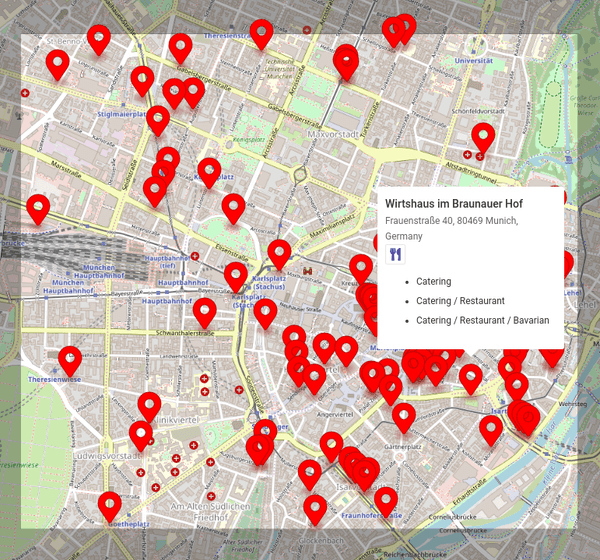
Search for WCs within 10 minutes walking from Alexanderplatz in Berlin
You can find the list of reachable within 10 minutes WCs in two steps:
STEP 1. Generate an isochrone from Alexanderplatz in Berlin:
https://api.geoapify.com/v1/isoline?lat=52.521670650000004&lon=13.413278026558228&type=time&mode=walk&range=600&apiKey=YOUR_API_KEYSTEP 2. Query amenities with the "amenity.toilet" category by the isochrone using the geometry ID returned by the previous step:
https://api.geoapify.com/v2/places?categories=amenity.toilet&filter=geometry:GEOMETRY_ID&bias=proximity:13.413637435864272,52.52197645&limit=100&apiKey=YOUR_API_KEYWe also add bias corresponding to the original location to sort the result by proximity.
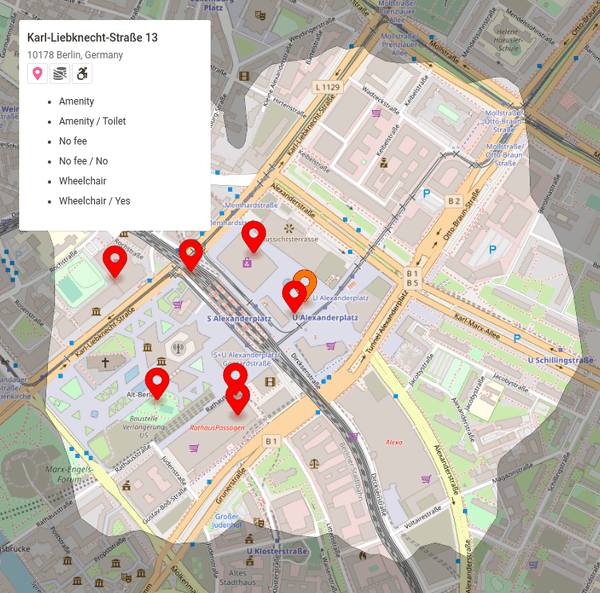
Query nearest 50 tourist sights from a location with barrier-free access
We will use a combination of the "tourism.sights" category and "wheelchair" condition for the query:
https://api.geoapify.com/v2/places?categories=tourism.sights&conditions=wheelchair&bias=proximity:7.744380838810624,48.5873243&limit=200&apiKey=YOUR_API_KEY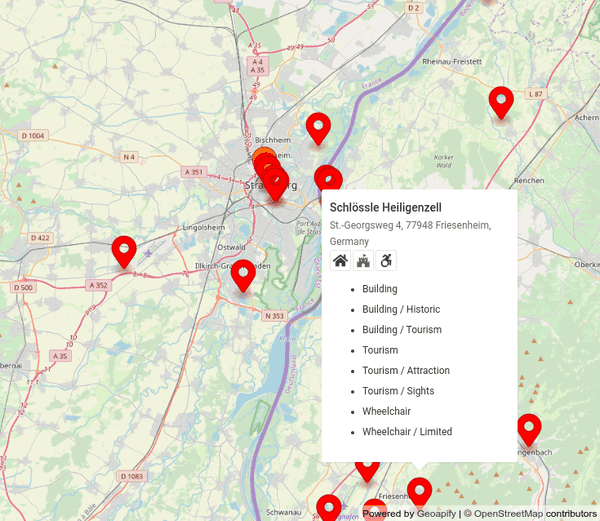
These API URLs demonstrate how you can solve various business problems by utilizing the Geoapify Places API. Replace "YOUR_API_KEY" in the URLs with your actual API key to make valid requests and receive the desired place data.
Check out our Tutorials for Places API:
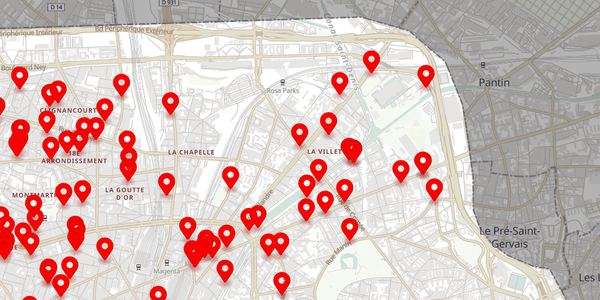
How to get OSM Places by category for a region

Guide to Using Chat GPT for Real Estate Descriptions Automation

How Real Estate Agents Can Assess Noise Pollution to Help Their Customers
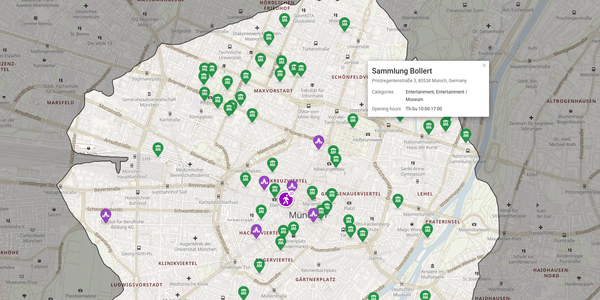
Map-Based App Development - Costs, Service Providers, Process and More
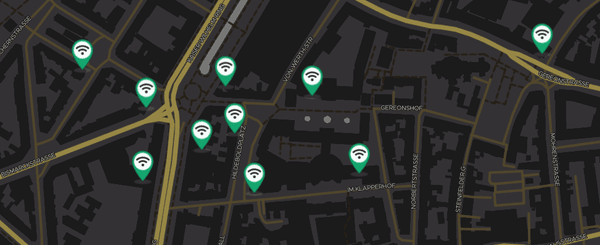
Guide to Points of Interest (POI) Data - Definition, Use Cases and Where To Get POI Data
Points of Interest API Pricing Details
Geoapify Places API offers flexible pricing based on usage to accommodate different business needs. The API uses a credit-based system to estimate requests cost.
For each request made to the Places API, you will be charged 1 credit. Additionally, for each additional set of 20 places requested in the response, an extra 1 credit will be deducted.
- Example 1: Let's say you request to search for 50 nearby restaurants in a specific location. This request counts as 1 credit. The API responds with a list of 50 restaurants. Since 50 places exceed the initial 20 places included in the request, an additional 1 credit is deducted. In total, this request would consume 3 credits: 1 + 1 * 2 = 3.
- Example 2: Suppose you perform a search for tourist attractions in a city with the limit = 500, and the API returns 120 attractions. In this case, the request costs 1 credit for the initial request and an additional 5 credits (1 credit per 20 places) for the remaining 100 places. So, the total consumption for this request would be 6 credits: 1 + 1 * 5 = 6.
The Free plan includes 3000 credits per day, allowing you to explore and evaluate the API at no cost. Beyond the free plan, pricing is determined based on the number of credits consumed, which depends on the usage of the API.
For more detailed information on pricing tiers, additional features, and credit packages, please visit our Pricing page. It provides a comprehensive overview of the available options to help you choose the most suitable plan for your business needs.
FAQ
What is Geoapify Places API?
Geoapify Places API is a service that enables developers to search for and retrieve information about places and points of interest programmatically. It provides access to a vast database of locations, allowing you to incorporate place search functionality into your applications and websites.
What types of places can I search for with the Places API?
You can search for a wide range of places, including restaurants, hotels, tourist attractions, parks, schools, hospitals, shopping centers, and much more. Our Location Search API supports more than 500 categories, enabling you to find places that match specific criteria or interests.
How can I search for places with the Places API?
You can search for places using various parameters, such as location coordinates, categories, proximity bias, filters, and reachability areas. These options allow you to refine your search and obtain accurate and relevant results.
Can I request additional information about a specific place?
Yes, you can retrieve detailed information about a place using the Place Details API, which provides enriched and structured data about a particular place, including its geometry, address, contact information, opening hours, user reviews, and more.
How can I display the results from the Places API on a map?
To show the results from the Places API on a map, you can follow these steps: retrieve the place data, extract the relevant information, use a map library or platform (e.g., Google Maps, MapLibre GL, Leaflet, Openlayers), and add markers or overlays to mark the places on the map. Consult the documentation of your chosen mapping solution for detailed instructions.
Does Geoapify Places API allow me to store and redistribute the results?
Yes, with Geoapify Places API, you are allowed to cache, store, and redistribute the results obtained from the API without any additional limits or restrictions. However, it is important to note that you must adhere to the required attribution guidelines specified by Geoapify when using and redistributing the data. This ensures proper acknowledgment and recognition of the data source.
Is attribution required when using Geoapify Places API?
Yes, attribution is required when using Geoapify Places API. As a minimum requirement, you must provide attribution to OpenStreetMap (OSM) as the data source. Additionally, if you are using the Places API on a free plan, you are also required to provide attribution to Geoapify. This ensures proper acknowledgment of the underlying data providers and helps support the open data community. Please refer to the attribution guidelines provided by OpenStreetMap for the specific requirements and formats of attribution.
What is the data source used by Geoapify Places API?
Geoapify Places API primarily utilizes OpenStreetMap (OSM) as its primary data source. OSM is a collaborative mapping project where users contribute and maintain geographic data worldwide. By leveraging OSM data, Geoapify Places API provides access to a rich and comprehensive database of places and points of interest for various locations.
What is the maximum number of places I can query in a single request?
With Geoapify Places API, you can set the parameter "limit" to 500 to retrieve the maximum number of elements in one response. You can use the "offset" parameter to access subsequent results pages if you need to retrieve more places. It's important to note that when the limit exceeds 20, each set of 20 items in the response counts as one Places API request toward your usage. This ensures efficient and fair API usage while allowing you to retrieve the desired number of places.
Which Places API is better: Geoapify or Google?
Geoapify is the better choice if you want affordable pricing, advanced filtering, privacy, and batch processing. Google Places API offers a larger proprietary POI database and user reviews but comes with higher costs and restrictions. Learn more in Geoapify as a Google Places API Alternative.
What is the rate limit for the Places API?
The Place Search API's rate limit varies based on your chosen pricing plan. We offer up to 30 requests per second for Places API requests, allowing efficient and scalable access to the API's functionalities. The specific rate limit associated with your plan ensures smooth and uninterrupted usage of the Places API for your application.
